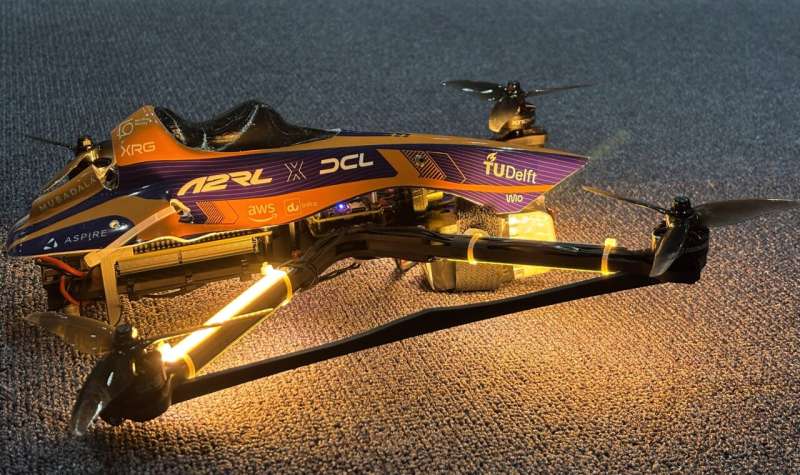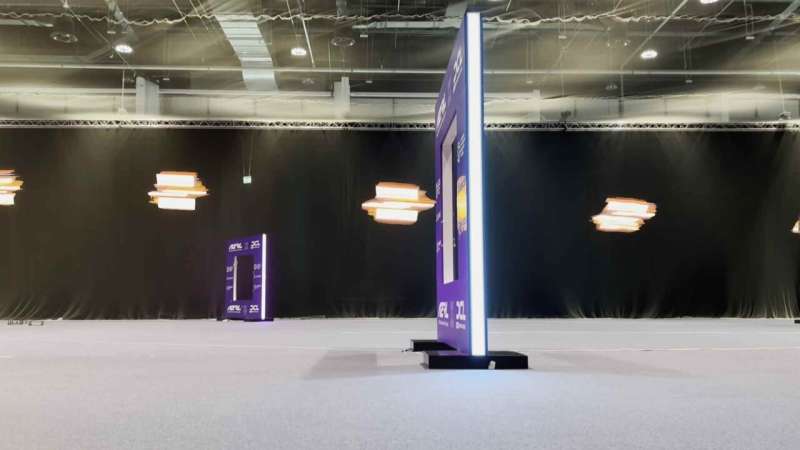
For the first time, a drone has bested human pilots in an international drone racing competition, signaling a significant advancement in artificial intelligence. On Saturday April 14, 2025, two drone racing events occurred concurrently: The Falcon Cup Finals for human pilots and the A2RL Drone Championship for AI-powered autonomous drones.
In a thrilling finale, the top AI drones also raced against the top human pilots. The AI drone created by Delft University of Technology clinched victory in the A2RL Grand Challenge. It then proceeded to win the knockout tournament against human pilots, outperforming three former DCL world champions and reaching speeds of up to 95.8 km/h on the intricate track.
The team from Delft University of Technology achieved this feat by developing a highly efficient and resilient AI system capable of precise, high-performance control. Unlike previous breakthroughs where AI defeated world champions in virtual environments, this triumph occurred in a real-world setting.
Two years ago, the Robotics and Perception Group at the University of Zurich became the first to defeat human drone racing champions with an autonomous drone. However, that remarkable achievement happened in a controlled flight lab environment, unlike this world championship where the competition organizers managed the hardware and track entirely.
Pushing the boundaries of physical AI
The objective of the 2025 A2RL Drone Championship in Abu Dhabi was to expand the frontiers of physical AI by encouraging research on robotic AI under extreme time constraints and with limited computational and sensory resources. The drone was equipped with just one forward-looking camera, a significant departure from previous autonomous drone races. This similarity to how human FPV pilots operate introduced additional challenges for the AI.
The AI that triumphed over the three former DCL world champions was developed by a team from the MAVLab at Delft’s Faculty of Aerospace Engineering. Team leader Christophe De Wagter expressed both exhaustion and elation.
AI directing the motors directly
A key innovation in the drone’s AI is the utilization of a deep neural network that directly controls the motors instead of sending commands to a traditional human controller. These networks were initially developed by the Advanced Concepts Team at the European Space Agency (ESA) known as “Guidance and Control Nets.”
Traditional algorithms for optimal control designed by humans were computationally intensive and impractical for onboard resource-limited systems like drones or satellites. ESA discovered that deep neural networks could replicate the outcomes of traditional algorithms with much less processing time. To validate the network’s performance on actual hardware in space, a collaboration was established with the MAVLab at Delft University of Technology.
“We currently train the network using reinforcement learning, a trial-and-error learning method,” says Christophe De Wagter. “This enables the drone to approach the physical system’s limits more closely. However, achieving this required a redesign of the control training procedure and how we gather insights about the drone’s dynamics from its onboard sensory data.”

Enhancing robotic applications
The highly efficient AI developed for robust perception and optimal control are crucial not only for autonomous racing drones but for other types of robots as well.
De Wagter explains, “Robot AI is restricted by the computational and energy resources it necessitates. Autonomous drone racing serves as an ideal testbed for developing and showcasing highly efficient, robust AI. Increasing the speed of flying drones will have significance for various economic and societal purposes, including timely delivery of medical samples and defibrillators and search-and-rescue operations in disaster scenarios. Additionally, we can utilize the methods developed to aim for criteria other than optimal time, such as optimal energy or safety. This will have implications for numerous other applications, from robotic vacuums to autonomous driving.”

